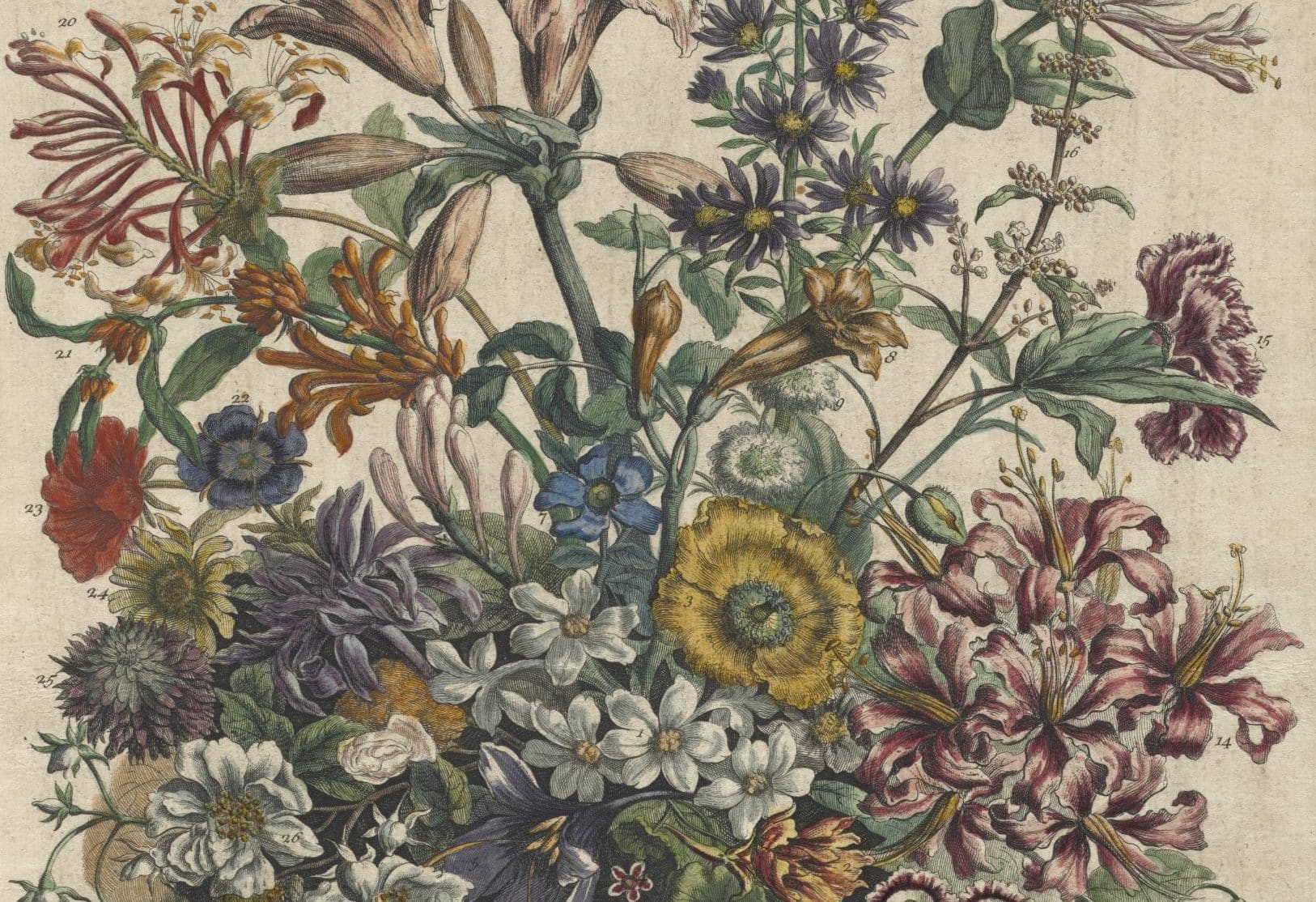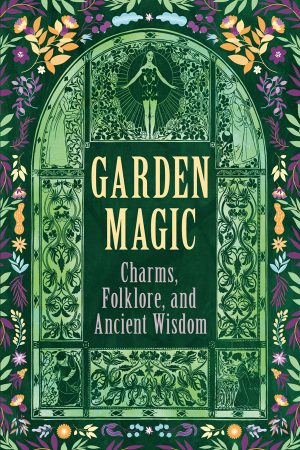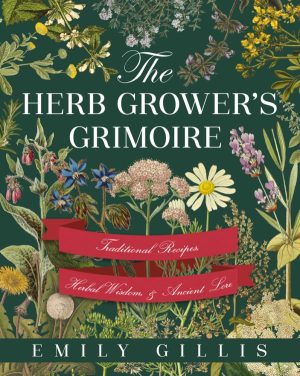Flowers are our lifelong companions. They accompany us through each celebration and provide solace during times of loss. Discover these quotes and spells for magical flowers that are perfect for Sabbat festivities, hand-joining ceremonies, and every-day rituals.
In joy or sadness, flowers are our constant friends.
(Okakura, 1906)
The following quotes and spells are from our Garden Magic grimoire. Discover many more magical flowers and richly detailed profiles of their powerful properties, folkloric history, and age-old remedies and charms.
Magical Flowers: Our Constant Friends
In joy or sadness, flowers are our constant friends. We eat, drink, sing, dance, and flirt with them. We wed with flowers. We dare not die without them. We have worshipped with the lily, we have meditated with the lotus, we have charged in battle array with the rose and the chrysanthemum. We have even attempted to speak in the language of flowers. How could we live without them? It frightens one to conceive of a world bereft of their presence. What solace do they not bring to the bedside of the sick, what a light of bliss to the darkness of weary spirits? Their serene tenderness restores to us our waning confidence in the Universe even as the intent gaze of a beautiful child recalls our lost hopes. When we are laid low in the dust it is they who linger in sorrow over our graves. (Okakura, 1906)
'The thread of life inhering in the tiniest seed, in the smallest plant, is the magic wand that may transmute the soil's dull metal into the gold of flower and fruit.'
(Rockwell. 1911)
Flowers seem intended for the solace of ordinary humanity: children love them; quiet, contented, ordinary people love them as they grow; luxurious and disorderly people rejoice in them gathered; they are the cottager’s treasure; and in the crowded town, mark, as with a little broken fragment of rainbow, the windows of the workers in whose hearts rests the covenant of peace. (Ruskin, 1902)
We have worshipped with the lily, we have meditated with the lotus, we have charged in battle array with the rose and the chrysanthemum.
(Okakura, 1906)
Magical Flowers and Herbs of Witches
The chief strength of some Witches lies in the gathering and boiling of herbs.
(Folkard, 1884)
As relics of the charms and prescriptions of the old Witches, countless superstitions connected with plants are to be found at the present day rife in all parts of the country.
Hecate, the Grecian goddess of the infernal regions, presided over magic and enchantment, and may fairly be styled the goddess, queen, and patroness of Witches and sorcerers. She was acquainted with the properties of every herb, and imparted this knowledge to her daughters Medea and Circe. To this trio of classical Witches were specially consecrated the following herbs: The Mandrake, the Deadly Nightshade, the Common Nightshade, the Wolf’s-bane, the Pontic Azalea, the Cyclamen, the Cypress, Lavender, Hyssop-leaved Mint, the Poley or Mountain Germander, the Ethiopian Pepper, the Corn Feverfew, the Cardamom, the Musk Mallow, the Oriental Sesame, the rough Smilax, the Lion’s-foot Cudweed (a love philtre), and Maidenhair, a plant particularly dear to Pluto. Medea was specially cognisant of the qualities of the Meadow Saffron, Safflower, Dyer’s Alkanet, the clammy Plantain or Fleawort, the Chrysanthemum, and the brown-berried Juniper.
The chief strength of some Witches lies in the gathering and boiling of herbs. The most esteemed herbs for their purposes are the Betony-root, Henbane, Mandrake, Deadly Nightshade, Origanum, Antirrhinum, female Phlox, Arum, Red and White Celandine, Millefoil, Horned Poppy, Fern, Adder’s-tongue, and ground Ivy. Root of Hemlock, ‘digged in the dark’, slips of Yew, ‘slivered in the Moon’s eclipse’, Cypress, Wild Fig, Larch, Broom, and Thorn are also associated with Witches and their necromancy. The divining Gall-apple of the Oak, the mystic Mistletoe, the Savin, the Moonwort, the Vervain, and the St. John’s Wort are considered magical, and therefore form part of the Witches’ pharmacopoeia—to be produced as occasion may require, and their juices infused in the hell-broths, philtres, potions, and baleful draughts prepared for their enemies. Cuckoo-flowers are gathered in the meadows on the first of May. Chervil and Pennyroyal are used because they both have the effect of making anyone tasting their juices see double. Often many herbs are boiled together—by preference seven or nine. Three kinds of wood make bewitched water boil. Witch-ointments, to be effective, must contain seven herbs. (Folkard, 1884)
Under the goddess’s footfall the flower springs up, as all growth withers where sorrowing lovers part.
(Grimm and Stallybrass, 1883)
As among men, so among herbs, the noble tower above the base: they were created by gods in some secluded sacred spot, they sprouted up where innocent blood had been shed, they were brought over by birds, and so on.
Under the goddess’s footfall the flower springs up, as all growth withers where sorrowing lovers part. On the mountain’s top, to which the lover had carried up his dying love, and poured out her last reviving draught, grew healing herbs that blessed the land at large Mountains foster what is rarest in the realm of plants. Zeus and Hera laid them down on Ida’s top: under them bountiful earth teemed up a new vegetation, dew-sprinkled clover and saffron and hyacinth, thick and soft, etc.
Many herbs and flowers are named after gods, but as we are seldom told the occasion of a name being given, it admits of more than one explanation. The god produced the plant, or he uses it, he loves it, loathes it, in shape or colour it resembles some part of his person, his raiment, arms, and so forth.
'To sow the seeds, to watch the tender shoots come out and brave the light and rain, to see the buds lift up their heads, and then to catch one's breath as the flowers open and display their precious colours, living, breathing jewels, is enough to live for.'
(Calthrop, 1910)
Flowers are a feminine adornment, young maidens twine the wreath, sage matrons cull the herb. Marner says prettily, ‘Why should not the wise women of even our earliest eld have been skilled in herb-lore?’ It is ascribed to witches and old women still, and apparently it is not without a meaning that from healing herbs the witches select names for themselves or their admirer. All witches’ herbs may most appropriately be called beschrei-kraut, beruf-kraut (speak ill, becall, bewitch), though the names have also been applied to particular plants. (Grimm and Stallybrass, 1883)
'If we know our garden well enough it will give us food—salad, fruits and nuts; it will cure us of our ills by its herbs; feed our imagination by the quaint names of flower and herb.'
(Calthrop, 1910)
Magical Flowers for Love Philtres and Divination
'It is impossible to describe to one who does not feel by instinct "the lure of green things growing", the curious stimulation, the sense of intoxication, of delight, brought about working among such green-growing, sweet scented things.'
(Earle, 1901)
There was a tradition among the country folk that the flower exerted a magical influence over the fortunes of lovers, and it was consequently the custom among the young men to carry it in their pockets.
The blossom was to be picked with the morning dew still on it, and if, after twenty-four hours the colour was still bright and fresh, the wearer could be assured that he would be successful in his wooing. It was also used as a love philter.
Sometimes maidens tested the faithfulness of their lovers by saying rhymes as they pulled the petals from the flowers, just as they do with the daisies. Miss Landon, in the Decision of the Flower, refers to this fortune-telling practice:
Now, gentle flower, I pray thee tell
If my lover loves me and loves me welt;
So may the fall of the morning dew
Keep the Sun from fading thy tender blue.
Now I number the leaves for my lot.
He loves not. He loves me. He loves me not
He loves me. Yes I thou last leaf, yes I
I’ll pluck thee not for the last sweet guess.
Mr. Coles, in Finger Ring-Lore, says that in divination the maids were careful to observe which way the flower leaned, and in connection quotes the following lines:
If on a shrub she casts her eye.
That spoke her true love’s secret sigh,
Or else, alas, too plainly told,
Her true love’s faithless heart was cold.
Discover many more magical flowers and the enchanting history of the world’s most wonderful plants to nurture your own garden with this spellbinding gardening companion.
You might also like our Herb Grower’s Grimoire, a beautifully illustrated guide to a witch’s essential magical flowers and herbs.




